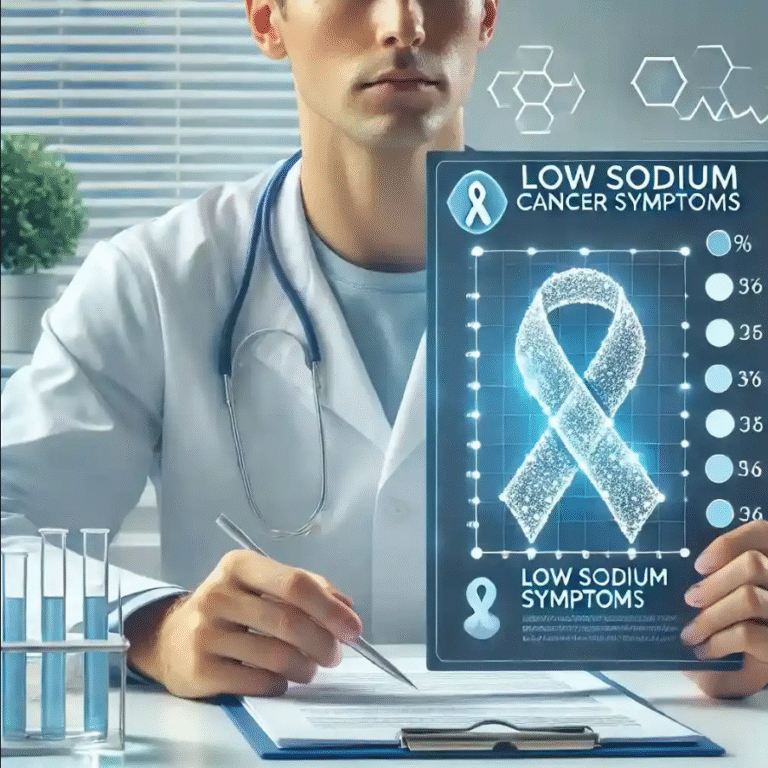Low sodium cancer symptoms are a serious concern that may indicate an underlying health issue. Sodium is an essential mineral that helps regulate nerve function, muscle movement, and fluid balance in the body. When sodium levels drop too low, especially in cancer patients, it can trigger a range of subtle to severe symptoms that should never be ignored.
What Are Low Sodium Cancer Symptoms and Why They Matter
Low sodium cancer symptoms often develop gradually and can easily be mistaken for general cancer fatigue or side effects of treatment. These symptoms occur when sodium levels in the blood fall below the normal range, usually due to excess water retention or sodium loss — both common in cancer and kidney-related conditions.
Causes Behind Low Sodium Cancer Symptoms
There are several possible causes behind low sodium cancer symptoms. Certain cancer treatments, such as chemotherapy or medications like diuretics and antidepressants, can affect sodium balance. Moreover, cancers that involve the lungs, brain, or gastrointestinal system can trigger a condition called SIADH (Syndrome of Inappropriate Antidiuretic Hormone Secretion), where the body retains too much water, diluting sodium levels in the blood.
Common Signs and Early Low Sodium Cancer Symptoms
Recognizing early low sodium cancer symptoms can help prevent complications. These initial signs often include:
- Nausea or vomiting
- Muscle cramps or twitching
- Dizziness or feeling lightheaded
- Low energy or persistent fatigue
- Headaches and irritability
Since these symptoms overlap with other cancer-related complaints, they are often overlooked unless sodium levels drop suddenly or severely.
Advanced and Severe Low Sodium Cancer Symptoms
In some patients, low sodium cancer symptoms can escalate rapidly, becoming medical emergencies. More severe signs include:
- Confusion or disorientation
- Hallucinations
- Seizures
- Loss of consciousness
- Coma
These severe symptoms indicate critical sodium imbalance and require immediate medical attention, especially in individuals with cancer undergoing intensive treatment.
How the Kidneys Influence Low Sodium Cancer Symptoms
The kidneys play a central role in managing sodium and fluid balance. When cancer affects kidney function—either directly or through side effects of treatment—it can lead to low sodium cancer symptoms. Kidney damage from chemotherapy, advanced cancer, or chronic kidney disease may limit the body’s ability to eliminate excess water, resulting in sodium dilution and related symptoms.
Diagnostic Process for Low Sodium Cancer Symptoms
Doctors use a combination of lab tests to confirm low sodium cancer symptoms. Blood and urine tests are crucial to measure sodium levels and check how well the kidneys are working. Reviewing medication use, cancer type, and overall fluid balance also helps determine the cause of low sodium.
Managing and Treating Low Sodium Cancer Symptoms
Treatment for low sodium cancer symptoms varies depending on the severity and cause. Possible interventions include:
- Restricting fluid intake
- Administering IV saline
- Adjusting medications that affect sodium levels
- Managing underlying conditions like SIADH or kidney disease
In cancer patients, a coordinated care plan involving oncologists, nephrologists, and dietitians ensures proper sodium management and symptom control.
Potential Complications of Untreated Low Sodium Cancer Symptoms
Ignoring low sodium cancer symptoms can lead to life-threatening outcomes. Untreated cases may result in:
- Severe neurological damage
- Muscle breakdown (rhabdomyolysis)
- Long-term cognitive impairment
- Increased mortality risk
Early diagnosis and proactive treatment significantly reduce the risks associated with sodium imbalance in cancer patients.
When to Seek Help for Low Sodium Cancer Symptoms
If you or a loved one with cancer experiences confusion, sudden fatigue, seizures, or fainting spells, it may be due to low sodium cancer symptoms. Contact a healthcare provider immediately to assess sodium levels and avoid further complications. Being aware and proactive can make all the difference in effective cancer care.
Final Thoughts on Low Sodium Cancer Symptoms and Health Management
Low sodium cancer symptoms are more than just a side effect — they are a medical condition that requires prompt attention. With the right medical care, fluid balance, and monitoring, patients can manage these symptoms effectively while continuing cancer treatment. Always discuss any new or unusual symptoms with your healthcare provider to ensure the best outcomes.


